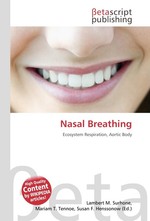

Ожидаемое поступление (если вы сделаете заказ прямо сейчас): 28.01.2026; планируемая отправка: 29.01.2026
Ожидаемое поступление (если вы сделаете заказ прямо сейчас): 02.02.2026; планируемая отправка: 03.02.2026
Технические характеристики
Please note that the content of this book primarily consists of articles available from Wikipedia or other free sources online. Nasal breathing refers to the state of inhaling and exhaling through the nose. It is considered superior to mouth breathing for several reasons. Breathing through the nose has numerous health benefits because the air travels to and from the external environment and the lungs through the sinuses as opposed to the mouth. The sinuses do a better job of filtering the air as it enters the lungs. In addition, the smaller diameter of the sinuses create pressure in the lungs during exhalation, allowing the lungs to have more time to extract oxygen from them. When there is proper oxygen-carbon dioxide exchange, the blood will maintain a balanced pH. If carbon dioxide is lost too quickly, as in mouth breathing, oxygen absorption is decreased. Nasal breathing is especially important in certain situations such as dehydration, cold weather, laryngitis, and when the throat is sore or dry because it does not dry the throat as much.